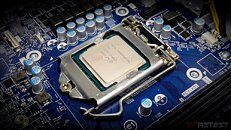Friday, February 14th 2020

Intel Core i9-10900 10-core CPU Pictured
Intel's desktop Comet Lake-S lineup is close to being released and we are getting more leaks about the CPU models contained inside it. Perhaps one of the most interesting points for Comet Lake-S series is that it brings a boost in frequency and boost in core count, with the highest-end Core i9 processors going up to 10 cores. Thanks to Xfastest, a Hong Kong-based media outlet, we have first pictures of what appears to be an engineering sample of the upcoming Core i9-10900 processor.
Being a non-K version, this CPU is not capable of overclocking and has a fixed TDP rating of 65 Watts. Compared to 125 W of the K models like the upcoming Core i9-10900K, this CPU will output almost half the heat, thus requiring a less capable cooling solution. The CPU is installed in LGA1200 socket, which is a new home for Comet Lake-S CPUs and provides backward compatibility for coolers supporting LGA1151. In the sample processor pictured below, we can see a marking on the CPU that implies 2.5 GHz base clock. Previously rumors were suggesting that this CPU version has 2.8 GHz base clock, however, it can be an early engineering sample given that no official imprints are found on the CPU heat spreader.
Source:
VideoCardz
Being a non-K version, this CPU is not capable of overclocking and has a fixed TDP rating of 65 Watts. Compared to 125 W of the K models like the upcoming Core i9-10900K, this CPU will output almost half the heat, thus requiring a less capable cooling solution. The CPU is installed in LGA1200 socket, which is a new home for Comet Lake-S CPUs and provides backward compatibility for coolers supporting LGA1151. In the sample processor pictured below, we can see a marking on the CPU that implies 2.5 GHz base clock. Previously rumors were suggesting that this CPU version has 2.8 GHz base clock, however, it can be an early engineering sample given that no official imprints are found on the CPU heat spreader.


106 Comments on Intel Core i9-10900 10-core CPU Pictured
Techspot has some directly comparable latency graphs:
www.techspot.com/article/1876-4ghz-ryzen-3rd-gen-vs-core-i9/
Sub 40ns latency is really hard on 9900k but much easier on a 8086k.